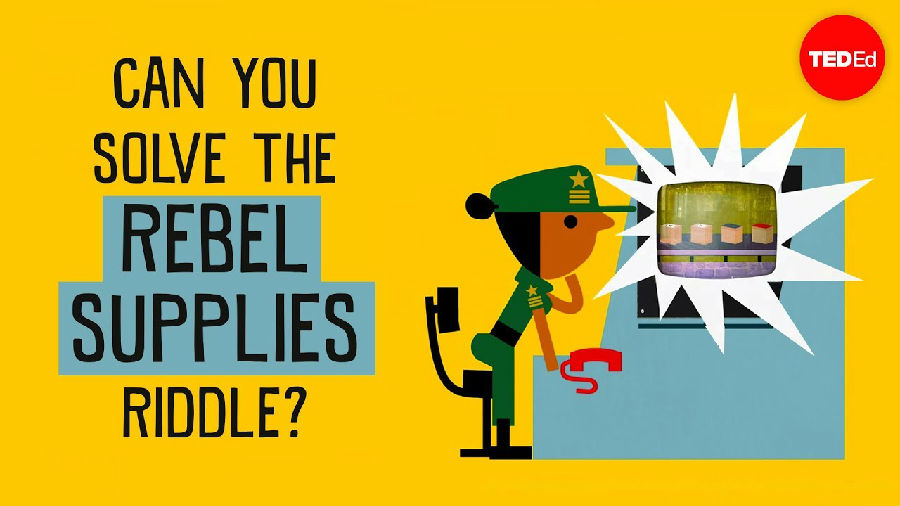(单词翻译:单击)
You're overseeing the delivery of crucial supplies to a rebel base deep in the heart of enemy territory.
你正在负责监管关键物资运输到反叛基地,该基地位于敌军营地的深处。
To get past Imperial customs, all packages must follow a strict protocol:
若要通过帝国海关,所有包裹必须严格遵循一条规定:
if a box is marked with an even number on the bottom, it must be sealed with a red top.
如果一个箱子的底部标有一个偶数,那么它的顶部必须是红色的封口。
The boxes are already being loaded onto the transport when you receive an urgent message.
正当箱子在被放到运输工具上时,你收到了一条紧急消息。
One of the four boxes was sealed incorrectly, but they lost track of which one.
四个箱子中的一个封装是不正确的,但他们不知道是哪一个。
All the boxes are still on the conveyor belt. Two are facing down: one marked with a four, and one with a seven.
所有的箱子都还在传送带上。两个是朝下放的:一个标着4,一个标着7。
The other two are facing up: one with a black top, another with a red one.
另外两个是朝上放置的:一个的顶部是黑色的,另一个是红色的。
You know that any violation of the protocol will get the entire shipment confiscated and put your allies in grave danger.
你知道任何规定违反会导致整皮货物被没收,让盟友陷入危险。
But any boxes you pull off for inspection won't make it onto this delivery run, depriving the rebels of critically needed supplies.
但任何你拿下来检查的箱子就赶不上这次运输了,致使反叛军无法得到急需的物资。
The transport leaves in a few moments, with or without its cargo.
运输工具马上就要离开了,无论是否有货物。
Which box or boxes should you grab off the conveyor belt?
那你应该从传送带取下来哪个或哪几个箱子?
It may seem like you need to inspect all four boxes to see what's on the other side of each.
你可能觉得你需要拿走全部4个箱子以检查另外一面的内容。
But in fact, only two of them matter. Let's look at the protocol again.
但其实,你只需要看两个箱子。让我们回顾一下规定。
All it says is that even-numbered boxes must have a red top.
它只说了偶数箱子必须要有红色封顶。
It doesn't say anything about odd-numbered boxes, so we can just ignore the box marked with a seven.
它并没有对奇数箱子做出任何规定,所以我们可以忽略标着7的那个箱子。
What about the box with a red top? Don't we need to check that the number on the bottom is even?
那么,那个红箱子呢?我们难道不需要检查它的底部是偶数吗?
As it turns out, we don't. The protocol says that if a box has an even number, then it should have a red top.
事实证明,确实不需要。规定说的是如果一个箱子标着偶数,那么它的封顶应该为红色。
It doesn't say that only boxes with even numbers can have red tops, or that a box with a red top must have an even number.
它并没有规定只有偶数箱子可以有红色封顶,或者一个红色封顶的箱子必须有偶数标记。

The requirement only goes in one direction. So we don't need to check the box with the red lid.
规定只要求了单方向的。所以我们不需要检查红色封顶的那个箱子。
We do, however, need to check the one with the black lid, to make sure it wasn't incorrectly placed on an even-numbered box.
不过我们确实需要检查黑色封顶的箱子来确保没有不小心把黑色封顶放到了偶数箱子上。
If you initially assumed the rules imply a symmetrical match between the number on the box and the type of lid, you're not alone.
如果你一开始假定了规定意味着箱子上的数字和封顶颜色是一个对称的对应关系,你不是一个人。
That error is so common, we even have a name for it: affirming the consequent, or the fallacy of the converse.
这个错误常见到我们甚至有一个名词来形容它:肯定后件或逆命题谬误。
This fallacy wrongly assumes that just because a certain condition is necessary for a given result, it must also be sufficient for it.
这种谬误错误的假设了只因为一个条件是一个后果的必要条件,那它一定是充分的。
For instance, having an atmosphere is a necessary condition for being a habitable planet.
举例来说,大气层是一个可居住的星球的必要条件。
But this doesn't mean that it's a sufficient condition -- planets like Venus have atmospheres but lack other criteria for habitability.
但这不意味着它是一个充分条件--水星或其它星球也有大气层,但是缺少其它居住的条件。
If that still seems hard to wrap your head around, let's look at a slightly different problem.
如果这还是有点难理解,让我们看一个不太一样的问题。
Imagine the boxes contain groceries. You see one marked for shipment to a steakhouse and one to a vegetarian restaurant.
想象一些装着杂货的袋子。你看到一个标着运往牛排店还有一个运往素食餐厅。
Then you see two more boxes turned upside down: one labeled as containing meat, and another as containing onions. Which ones do you need to check?
然后你看到另外两个反着放的箱子:一个标着含有肉,另一个标着含有洋葱。你需要检查哪个呢?
Well, it's easy -- make sure the meat isn't being shipped to the vegetarian restaurant, and that the box going there doesn't contain meat.
这很容易--确保肉不会被运到素食餐厅,以及运到素食餐厅的箱子里没有肉。
The onions can go to either place, and the box bound for the steakhouse can contain either product.
洋葱去哪里都可以,而运往牛排店的箱子可以含有任意一种食材。
Why does this scenario seem easier?
为什么这个情况感觉更容易?
Formally, it's the same problem -- two possible conditions for the top of the box, and two for the bottom.
本质上,它是同一个问题--箱子上面有两种,可能底下也有两种。
But in this case, they're based on familiar real-world needs,
但这个问题是基于我们现实生活中熟悉的需求,
and we easily understand that while vegetarians only eat vegetables, they're not the only ones who do so.
所以我们很容易可以理解虽然素食主义者只吃蔬菜,但是他们不是唯一吃蔬菜的人。
In the original problem, the rules seemed more arbitrary, and when they're abstracted that way, the logical connections become harder to see.
在原来的问题中,规定看起来更随便一些,而当它们被抽象成这样时,就更难看出隐含的逻辑关系。
In your case, you've managed to get enough supplies through to enable the resistance to fight another day.
在你的情况中,你成功的让足量的物资运送过去以支撑反叛军继续战斗。
And you did it by thinking outside the box -- both sides of it.
而你能解决这个问题,就是因为你的思考“跳出了箱子”--它的两面。


